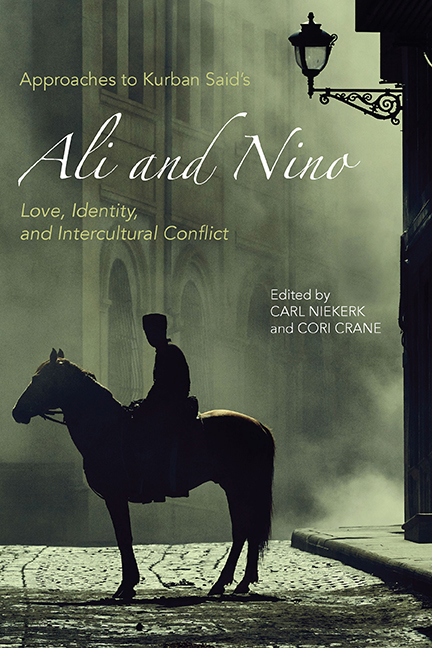Book contents
- Frontmatter
- Contents
- Acknowledgments
- Notes on Editions of and References to Ali and Nino
- Introduction: Ali and Nino as World Literature
- 1 Ali and Nino: The Novel as/of Cultural Translation
- 2 Crossing Borders, Crossing Disciplines: Ali and Nino in the Twenty-First Century
- 3 Glowing Rubies and Persian Daggers: The Role of Persian Poetry in Ali and Nino
- 4 Gendered Stereotypes and Cross-Cultural Moral Values through the Eyes of Kurban Said
- 5 Orientalist Itineraries: Cultural Hegemony, Gender, Race, and Religion in Ali and Nino
- 6 Gendered Conflicts in Muslim and Christian Cultures: Honor (and Shame) in Ali and Nino
- 7 Love and Politics: Retelling History in Ali and Nino and Artush and Zaur
- 8 “Herr Professor, Please: We'd Rather Stay in Asia”: Ali Khan Shirvanshir and the Spaces of Baku
- 9 The Female Body and the Seduction of Modernity in Ali and Nino
- 10 Seeing the Unseen: Symbolic Writing in Ali and Nino
- 11 Ali and Nino and Jewish Questions
- 12 Between Orientalism and Occidentalism: Culture, Identity, and the “Clash of Civilizations” in Ali and Nino
- Works Cited
- Notes on the Contributors
- Index
1 - Ali and Nino: The Novel as/of Cultural Translation
Published online by Cambridge University Press: 30 August 2017
- Frontmatter
- Contents
- Acknowledgments
- Notes on Editions of and References to Ali and Nino
- Introduction: Ali and Nino as World Literature
- 1 Ali and Nino: The Novel as/of Cultural Translation
- 2 Crossing Borders, Crossing Disciplines: Ali and Nino in the Twenty-First Century
- 3 Glowing Rubies and Persian Daggers: The Role of Persian Poetry in Ali and Nino
- 4 Gendered Stereotypes and Cross-Cultural Moral Values through the Eyes of Kurban Said
- 5 Orientalist Itineraries: Cultural Hegemony, Gender, Race, and Religion in Ali and Nino
- 6 Gendered Conflicts in Muslim and Christian Cultures: Honor (and Shame) in Ali and Nino
- 7 Love and Politics: Retelling History in Ali and Nino and Artush and Zaur
- 8 “Herr Professor, Please: We'd Rather Stay in Asia”: Ali Khan Shirvanshir and the Spaces of Baku
- 9 The Female Body and the Seduction of Modernity in Ali and Nino
- 10 Seeing the Unseen: Symbolic Writing in Ali and Nino
- 11 Ali and Nino and Jewish Questions
- 12 Between Orientalism and Occidentalism: Culture, Identity, and the “Clash of Civilizations” in Ali and Nino
- Works Cited
- Notes on the Contributors
- Index
Summary
MANY YEARS AGO in a different age and place, in a bookstore that carried English-language books in an upscale neighborhood of Ankara, I found a novel, titled Ali and Nino, by a certain Kurban Said, an author I had never heard of. The name was undeniably one of someone from the Middle East. Thus, I was surprised to find out that the book was translated from the original German. Kurban Said was obviously a pseudonym, but whose? A few years later, this time as a graduate student at the University of Washington in Seattle, I found another copy of Ali and Nino in a used bookstore. By then, I had lost or misplaced the first one. None of my well-read professors nor any of my bookish graduate school friends had ever heard of this book written in German, though resonating with memories of other languages: Persian, Azeri, Russian, and Turkish. Who was this modern Heine, or even Nietzsche, with a piercing insight into religion, morality, and slave and philistine mentality? Wrapped in a cross-cultural and star-crossed love story, the novel chronicled the devastation brought upon the oil rich city of Baku in Azerbaijan by the First World War and the Bolshevik Revolution. At the time, I thought this short novel would be a stimulating and informative addition to the German major reading list, but the book was out of print, and we were still bound by the “canon of German literature.”
Some time ago I found the English translation of another novel by this mysterious Said, The Girl from the Golden Horn (Das Mädchen vom Goldenen Horn, 1938), whose protagonist Aziyadeh, a young woman from the Ottoman court and student of Oriental languages in Berlin, was forced into exile with her widowed father when the Ottoman dynasty was banished after the First World War. Coincidentally, another Aziyadé (spelled slightly differently in French) is also the protagonist of Pierre Loti's Orientalist novel Aziyadé (1879). But this Said clearly was no Orientalist in the sense established by the other Said, Edward Said, who defined Orientalism as a methodological and disciplinary appropriation of the cultures of the Orient in its broadest geographical parameters. He (or perhaps she?) seemed to be writing from the inside…
- Type
- Chapter
- Information
- Approaches to Kurban Said's Ali and NinoLove, Identity, and Intercultural Conflict, pp. 15 - 28Publisher: Boydell & BrewerPrint publication year: 2017

